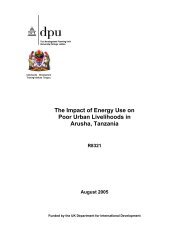EPA Review Annex Documents - DFID
EPA Review Annex Documents - DFID
EPA Review Annex Documents - DFID
Create successful ePaper yourself
Turn your PDF publications into a flip-book with our unique Google optimized e-Paper software.
• There is adequate technical advisory capacity on all the issues in Nigeria, e.g. technical<br />
advisory committee on services, on WTO, among others, but there is lack of political will to<br />
appropriately use this capacity and upgrade it.<br />
<strong>EPA</strong> Development Programme<br />
• Since <strong>EPA</strong> is legally targeted at creating sustainable development and since West African<br />
sub-regions has decided to pursue a development-friendly <strong>EPA</strong>, the <strong>EPA</strong> Development<br />
programme becomes imperative for <strong>EPA</strong> to be signed. Therefore, the regional development<br />
fund needs to be created and supported on a long term basis by the EU.<br />
• The issues of how countries will cope during <strong>EPA</strong> implementation are not being adequately<br />
addressed and is also affecting the pace, as there has not been any serious commitment<br />
from the ECOWAS commission or the EU to give funding assistance for the first one to five<br />
years,<br />
• Though the region has estimated and requested for $9.25 billion to cushion the effect of<br />
implementation of <strong>EPA</strong>, the EU has so far been evasive on the issue, insisting that member<br />
countries do not legally commit themselves to long term aid but will encourage them to<br />
contribute to a development programme.<br />
• Nigeria expects the <strong>EPA</strong> Development Programme (<strong>EPA</strong>DP) to make infrastructure, capacity<br />
building and industrial upgrading as priority. Nigeria is presently prioritising its submission of<br />
€11 billion to arrive at a figure that will accommodate other ECOWAS countries.<br />
There are intangible benefits of <strong>EPA</strong> which include:<br />
• Positively reshaping regional integration process in West Africa showing reality of<br />
integration; through provoking enquiries about:<br />
� West African regional institutions and the political exigencies of two regional<br />
institutions coexisting;<br />
� The possibility of customs union with two institutions; and<br />
� Why there is no free movement in the real sense of goods and service and people in<br />
the region.<br />
• Building capacity of a lot of people whose interests in international trade or trade economics,<br />
international relations are being created, some through own efforts in different areas of trade.<br />
• The involvement of NGOs, some of which have emerged with interest and objectives in<br />
poverty reduction using the trade channel, and mainstreaming women and gender issues in<br />
trade.<br />
• The ECOWAS Commission is tasked to take up the serious challenge of ownership of the<br />
process.<br />
• Facilitation of the awareness and use of regional and national experts.<br />
• Nigeria, Ghana, Cote d’Ivoire and Senegal are involved in discussions to strengthen regional<br />
integration.<br />
Non-state actors especially civil society organisations have influenced the negotiations<br />
by:<br />
• Ensuring that stakeholders’ interests are raised to discuss the <strong>EPA</strong>.<br />
• Making the focus of negotiations of the <strong>EPA</strong> more development-oriented.<br />
• Strategising with government, ensuring that stakeholders are carried along in the process<br />
and that the procedure for the negotiation is a bottom up approach.<br />
146
















